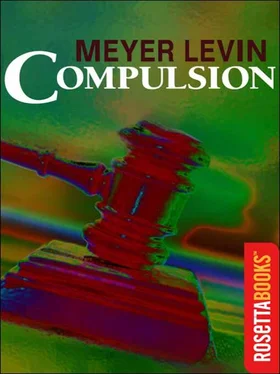We all noted that the judge nodded, as though he had at last heard common sense spoken.
Horn went on. Had the professor observed any lack of emotion in the subjects?
Artie had shown intense emotional reaction. And as Judd had stated that he had systematically suppressed any show of emotion since childhood, his lesser show of emotion was self-explanatory. Yet no one could deny intense emotion in his relationship to his companion, Mr. Straus.
Smiling, Horn asked whether the professor would agree with the statement that Judd was “pathologically suggestible”?
“I saw no evidence that he was at all suggestible.”
And Judd’s sense of inferiority in reference to his puny stature – was it so marked that it could be called pathological?
Indeed, no! The young gentleman was not, after all, a dwarf.
Finally, taking into account not only his own examination but the Storrs-Allwin report, both young men had to be pronounced unquestionably sane.
Wilk approached, conversing casually, reminding Dr. Ball of the many pleasant discussions they had had. Wilk knew he was a scientist of integrity who would state his facts accurately.
Now that examination lasting a few hours, in a crowded office – had that been a good opportunity for an examination?
In some aspects, yes. A man had to be in excellent possession of his faculties to give a detailed and accurate recital in the midst of such distraction.
Granted. But was the situation well adapted to bringing out everything connected with the mental state of an individual?
Professor Ball smiled. “Let me frankly avow, Mr. Wilk, that I would not consider it a complete mental examination, if that is what you are driving at.” But as far as the requirements of the case were concerned, Dr. Ball was satisfied that his conclusions were accurate.
Undoubtedly, Wilk agreed, if one limited oneself to the legal definition of insanity. But would the doctor not admit that the legal definition was inadequate by medical standards?
Yes, the doctor agreed. And here in the Storrs-Allwin report was the evidence of a prolonged examination. Yet he could not agree with the conclusions.
Wilk quoted from an article by Dr. Ball in a medical journal, “‘The whole past life of the patient, his diseases and accidents, his schooling, environment, and character, and the entire history of his antecedents should be examined’.”
“Yes!” Dr. Ball readily agreed. “In a case for treatment. But this is not necessary, if one seeks only to determine their legal sanity.”
Wilk smiled. “We too consider them legally sane. We are here to ask for mitigation on the grounds of a medical condition of mental abnormality which probably could not be observed in a rapid examination. Did you make any notes on that occasion, Dr. Ball?”
A few. Dr. Ball brought out a folded sheet of paper; he deciphered and read aloud a scrawled word, “ Zuganglich ”.
“What does that mean?”
“It is a term used in psychiatry, for ‘accessible’. We first determine whether the patient can be reached in normal communication, or whether, as it is popularly put, he is too far gone.”
“And they were not too far gone?”
“Not at all. Completely Zuganglich .” Edgar Feldscher smiled.
Wilk asked, “You have other notes?” Yes, but the rest of his notes he had to confess he couldn’t make out. Dr. Ball chuckled, joining the general laughter.
Then, coming to the fantasies, hadn’t the doctor written somewhere that dreams and fantasies were the clues to the condition of the mind?
Why, yes, the professor agreed, with a new air of interest. But persistent fantasies wouldn’t indicate a disorder unless of course they reached the delusional stage.
“That is the stage where fantasy becomes confused with fact?”
Yes, when a fantasy was accepted as reality, as actually happening, there was delusion.
A young man, a college graduate, playing cops-and-robbers in the street, following his uncle to his door, wasn’t he acting out a fantasy and making it real?
The professor smiled. “It could appear so,” he said. “But you would have to know just how far he was lost in his little game.”
Wilk swung now to another form of derangement. An obsession, an obsessive belief – didn’t that reach up to the state of a delusion? For example, there were people who believed absolutely in religious visions and predictions, believed themselves to be saints and messiahs.
“Oh, yes,” Dr. Ball agreed, “there are people who are confined to insane asylums because of such delusions.”
“Now, couldn’t the same thing be the result of a philosophical belief?”
“If one believed strongly enough.” But Wilk didn’t ask the expected, linking question. Instead he asked whether there were states of mind, short of mental disorder or insanity, that would alert one for watching and that would even call for treatment.
Yes, yes, indeed, Dr. Ball said.
Their pleasant discussion was over. Dr. Ball’s real conclusions, if one thought about them seriously, were precisely those of the defence.
It was the second of the State’s alienists who brought out, in Wilk, a kind of savage brutality that we had until then associated only with Horn.
The witness was Dr. Stauffer, pudgy, self-assured. A familiar figure in the courts, Tom told me. “Makes his living testifying for the State.” Yet his record was impressive enough; he had been head of the department of psychology at the University of Illinois; he had been in charge of the psychiatric laboratory at the State Hospital for the Insane.
There seemed scarcely any point to his lengthy recital, until Dr. Stauffer came to Artie’s description of the ride with the body. “He told how they got to a blind road near a Russian Orthodox cemetery. He related that there they stripped the body from the waist down, took off the pants, shoes, and stockings. Now, there is a little matter here I would like to speak of just before you and the attorneys, if I may, Judge.”
The group of lawyers huddled around the judge’s bench. The doctor sanctimoniously lowered his voice. “It was because of this circumstance of undressing the boy just from the waist down.” He had made that the occasion to ask a great many questions along the line of sexual perversion and homosexual practices.
It was clear that he had got nothing out of the boys. He had raised the question of abuse, undoubtedly with Horn’s approval, purely for the effect of suggestion. Wilk’s face had become dark, clotted.
Stauffer continued with his description of the burial, piling on the details. “Straus stated that the body was stiff and the eyes were glazed. They let the body down easily into the culvert so that it would make no splash…”
He had asked Artie Straus if at any time he could have withdrawn, “and he stated that he always hated a quitter, that he had no use for a coward. Mr. Steiner made practically the same answer.”
Categorically, the doctor testified that each defendant was sane, in excellent possession of his faculties, including the faculty of judgment.
Horn asked him then whether he was familiar with the “new psychology”. Certainly, said Dr. Stauffer, he was entirely familiar with it, but he did not believe in it at all. Why, if the defence was successful here, every criminal would start studying dream books!
Through the laughter, Wilk advanced upon Dr. Stauffer, head down. He halted at some distance, as if to avoid contamination.
How long was it since Dr. Stauffer had been in the actual practice of medicine, where he might be trying to help someone?
Horn objected.
The question amended, Dr. Stauffer replied that he had not for ten years been in practice, being occupied with teaching and research.
Читать дальше












